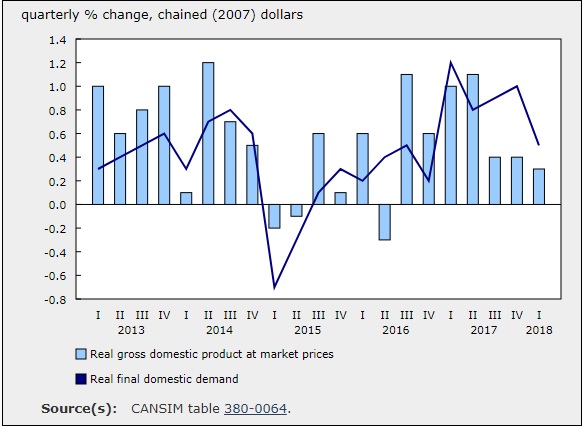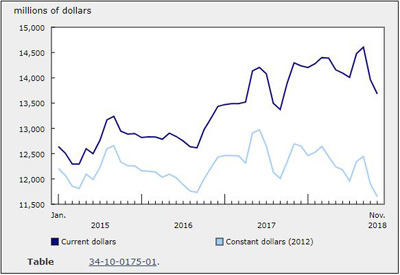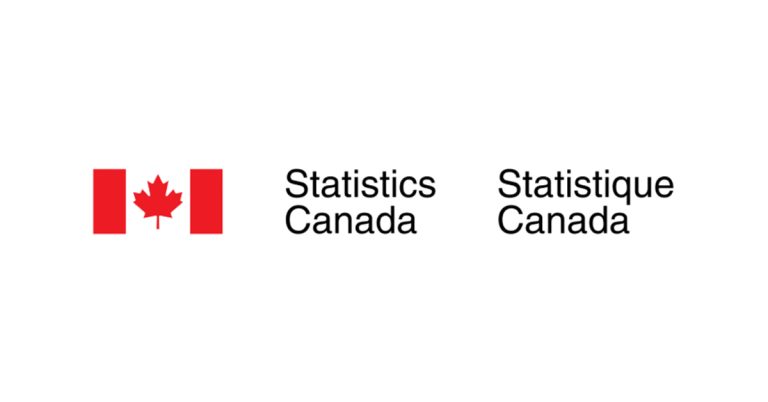GDP Grew 0.3% in Q1 2018

June 18, 2018
Real gross domestic product (GDP) grew 0.3% in the first quarter, following an increase of 0.4% in each of the previous two quarters. Final domestic demand rose by 0.5%.
Growth was moderated by a deceleration in household spending, lower exports of non-energy products, and a decline in housing investment (-1.9%).
Household spending grew 0.3%, the slowest pace since the first quarter of 2015. Growth was driven by increased outlays on services (+0.5%). Household spending on goods was unchanged, following 11 consecutive quarterly increases.
Export volumes rose 0.4% after increasing 1.0% in the fourth quarter of 2017. Exports of crude oil and crude bitumen (+9.9%) largely contributed to the gains. Exports of services grew 1.7% in the first quarter, following a 1.3% increase in the previous quarter.
Business investment in machinery and equipment (+4.2%) and intellectual property products (+3.3%) increased at a faster pace than in the fourth quarter of 2017.
Expressed at an annualized rate, real GDP was up 1.3% in the first quarter. In comparison, real GDP in the United States grew 2.2%.
Housing investment falls
Investment in housing fell 1.9% in the first quarter, the largest decline since the first quarter of 2009, due to a drop in ownership transfer costs (-13.5%). Lower resale activity coincided with new mortgage stress measures introduced nationwide in January. Business outlays on new construction slowed to 1.2% growth, while renovations increased 1.4%.
Consumer spending decelerates
Household final consumption expenditure decelerated for a third consecutive quarter, slowing to 0.3% in the first quarter. Outlays on goods were virtually unchanged, while outlays on services grew 0.5%.
Housing-related expenses (housing, water, electricity, gas and other fuels) increased 0.8% and outlays on insurance and financial services grew 1.5%. Purchases of vehicles were flat in the first quarter, following strong growth in 2017.
Non-residential investment increases
Investment in machinery and equipment rose 4.2% in the first quarter, with medium and heavy trucks, buses and other motor vehicles (+12.5%) and industrial machinery and equipment (+3.9%) contributing to the growth. Intellectual property products rose 3.3%, as mineral exploration and evaluation (+8.0%) rebounded and software (+3.2%) accelerated. Investment in non-residential structures increased 1.5%.
Export growth slows
Growth in export volumes slowed to 0.4% in the first quarter, following a 1.0% gain in the previous quarter. The first quarter growth was driven by exports of services (+1.7%), including commercial (+2.2%) and travel (+1.7%) services.
Exports of goods edged up 0.2%, as growth in crude oil and crude bitumen (+9.9%) and motor vehicles and parts (+2.0%) was partially offset by lower exports of refined petroleum energy products (-18.8%).
Imports rose by 1.2% in the first quarter, with similar increases in goods and services.
Growth in imports of goods was led by passenger cars and light trucks (+5.9%), tires, motor vehicle engines and parts (+6.0%) and basic chemicals and industrial chemical products (+8.6%).
Imports of services rose 1.1%, as those of commercial (+1.3%), transportation (+1.4%) and travel (+0.6%) services all increased.
Inventories continue to accumulate
Businesses added $15.2 billion to their inventories in the first quarter, following an accumulation of $15.9 billion in the previous quarter. Wholesalers (+$5.4 billion), manufacturers (+$4.0 billion) and retailers (+$2.6 billion) all added to their stocks. Farm inventories grew by $567 million, compared with an accumulation of $2.7 billion in the fourth quarter of 2017. The economy-wide stock-to-sales ratio increased from 0.760 to 0.765 in the first quarter.
Economy-wide income increases
Real gross national income (the real purchasing power of income earned by Canadian-owned factors of production) increased 0.5% in the first quarter, outpacing real GDP growth for a third consecutive quarter.
The GDP implicit price index, representing the price of goods and services produced in Canada, rose 0.3%. Export prices (+1.0%) increased at a faster pace than import prices (+0.7%), leading to slightly improved terms of trade.
Gross operating surplus (in nominal terms) grew 0.7%, led by increased earnings of energy producers.
Household disposable income rose by 0.8%, as compensation of employees was up 1.0%. The household saving rate edged down to 4.4%, with household spending slightly outpacing disposable income in the first quarter.
Source: Statistics Canada, www150.statcan.gc.ca/n1/daily-quotidien/180531/dq180531a-eng.htm











